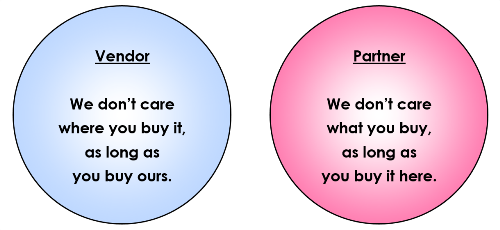I’ve been in more than a few meetings with vendors where the question of trust has come up. Typically it sounds like this… “I’ve got an opportunity,
and I want to give it to a partner, but I’m concerned they’ll make a mess of it or sell something else, so I’ll hold on to it till I’m sure it’s going
to close, and give it to them just before we get the PO”.
The problem with that sentiment is that, although you might think you’re doing your partners a favour, you’re actually robbing yourself (and your partner)
of a chance to enable them and maximise their profitability. It’s also educating your partners to behave in exactly the opposite way of how most vendors
want their partners to behave.
Partner Profitability
If you’ve been paying attention to our blog articles over the last few years, you’ll know we have a very strong belief that partner profitability is the
major factor in influencing partner selling behaviour. You would have also picked up that in many instances, partners make more money from the services
they wrap around your product than they do from the margin they make on your product.
The longer you take to introduce your partner into an opportunity, the less time they have to sell their added value, thereby reducing the opportunity to
maximise their profitability. In fact, by leaving it too late, you may inadvertently increase the sales cycle as the partner now needs to sell their
services, which may require an additional set of approvals.
If you want a general rule of thumb as to how to deal with partners, just trade places and ask yourself… “what would I want them to do if the situation
was reversed?” For example, if they had uncovered the opportunity, would I want them to introduce me into the account earlier or later? (note: this
is where the question of trust that I raised earlier comes up, so let me tackle that at the end of the article).
Lessons from Fishing
You know the old adage… “Give a man a fish, and you feed him for a day. Teach a man to fish, and you feed him for a lifetime”. When you introduce
a partner after you’ve “closed the deal”, you’re effectively training your partners how to fulfil, not uncover, opportunities. I constantly hear vendors
saying “I can’t give this to my partners – they don’t know how to sell it”. Well I’m going to be blunt and say that maybe that’s because you haven’t
enabled them.

Let’s be clear… if your idea of “enablement” is a one-hour sales presentation that focuses mainly on your product’s capabilities and differentiators,
where attendance is driven largely by the quality of the donuts you brought, then you are way off the mark.
Anyone in a technical role will tell you they learned more from problem installations than smooth ones. Similarly salespeople learn more from dealing with
problem customers than ones that simply ring up to place an order. If you really want to enable your partners, you need to bring them in early, let
them get their hands dirty, work as a team, and educate them along the way.
A Question of Trust
Now let’s go back to the issue I posed at the start. You have a quarterly number you have to hit, you’ve uncovered an opportunity you think you can close,
and the question you’re asking yourself is… “do I give it to a partner to close, or do I close it and give it to a partner?”
The more valuable question you should be asking is… “do I want to be a fisherman, or a fishing instructor?”
And if you’re a channel sales person, then you and your partner need to put on your wet weather gear, go out together on that rock face, and you show them
how to put bait on a hook, throw a line and reel in their dinner, rather than giving them a pack of frozen fish fingers.
Trading Places
But have you ever stopped to think about it from your partner’s point of view? They may have uncovered an opportunity that they think they can close. Most
likely that opportunity involves services, third party products and possibly competitive products. If they bring you in, they risk the potential for you
to push a different agenda, undermine their messaging, devalue the importance of their services, and possibly artificially force the purchase of a product
for which neither they nor the customer are ready to install.
More importantly, they may face the situation you’re dreading… i.e. The customer decides they want to go with them, but using a different product
to yours. Now it’s YOU that’s jeopardising THEIR sale!
How do you want them to act? Do they walk away – refuse to deal with that customer unless they buy your product? Do they switch to a different product
with the same “that’s what the customer asked for” excuse that vendors use when they switch partners or sell direct? Or do they let you know that you
might lose this one, so you can give it one last shot or decide to walk away?
A Different Perspective
It’s important to remember that vendors and partners have different perspectives:

Your partnership is only mutually beneficial in the overlap of the two circles:

That means for any difficult decision you need to make about a partner, they have an equivalent scenario, but in reverse. It’s easy to decide how you want
to deal with a partner – just trade places and look at it from their perspective… what would you do if the situation was reversed?


